Complete Solutions to SECTION - A of chapter FOOTSTEPS towards(CBSE Board) of Class 8 book with complete answers and questions
| Class 8 | CHEMISTRY |
| Chapter | FOOTSTEPS towards(CBSE Board) |
| MTG IIT JEE FOUNDATION | SECTION - A |
| Number Of Questions | 47 |
| Academic Year | 2023-24 |
Name the materials used in making
parachutes and ropes for rock climbing.
View SolutionName the materials used in making
non-stick cookwares.
View SolutionGive one use of each of the following:
Bakelite
View SolutionGive one use of each of the following:
Acrylic
View SolutionWhat will happen if you drop
a silver ring in a copper sulphate solution?
View SolutionWhat will happen if you drop
copper wire into ferrous sulphate solution?
View SolutionName the products formed by destructive distillation of coal.
View SolutionDefine the term 'ignition temperature?
View SolutionName the metal which is an essential component of haemoglobin.
View SolutionDifferentiate between metals and non-metals on the basis of sonorosity.
View SolutionGive name of the non-metal which is source of energy in the Sun and stars.
View SolutionDifferentiate between metals and non-metals on the basis of ductility.
View SolutionSynthetic fibres are not comfortable to wear in summers. Why?
View SolutionPaper cup containing water does not catch fire when placed over a flame. Give reason.
View SolutionGiven below is the characteristic of plastics. Write two uses for the characteristic. Light, strong and durable
View SolutionWhich is a better fuel-coal or coke? Why?
View SolutionDefine carbonisation.
View SolutionGiven below is the characteristic of plastics. Write two uses for the characteristic. Poor conductors of heat and electricity
View SolutionFires produced by burning petrol are not extinguished by pouring water. Give reason.
View SolutionGive the name of one natural polymer.
View SolutionFull form of LPG
View SolutionIdentify the incorrect reactions.
(A) `Mg + CuSO_4 to MgSO_4 + Cu`
(B) `Cu + 2AgNO_3 to 2Ag + Cu(NO_3)_2`
(C) `3Cu + Al2(SO_4)_3 to 3CuSO_4 + 2AI`
(D) `Fe + ZnSO_4 to FeSO_4 + Zn`
View SolutionHow natural gas can be obtain from crude oil?
View SolutionAssertion : Calcium starts floating on the surface of water as the bubbles of hydrogen gas produced stick to the surface of calcium.
Reason: Calcium does not react with water.
View SolutionAssertion : In case of oil fires, to exitinguish the fire, the burning materials is not sprayed with water.
Reason: Density of water is less than density of oil.
View SolutionAssertion : The ignition temperature of kerosene oil is lower than that of wood.
Reason: A combustible substance cannot catch fire as long as its temperature is lower than its ignition temperature.
View SolutionAssertion: In refining of the crude oil, the hydrocarbons with the highest boiling points condense first and get collected near the base of the fractionating tower.
Reason: The temperature decreases from bottom to top in the fractionating column.
View SolutionMost of the metals react chemically with other substances in one form or another. Few metals which do not react with common chemicals are called noble metals e.g., silver, gold, platinum. The rate of reaction with which metals react is not same for all the metals. The rate of reaction depends on the reactivity of metals. On the basis of their reactive nature, a series known as reactivity series has been drawn in which metals are arranged in decreasing order of their reactivity.
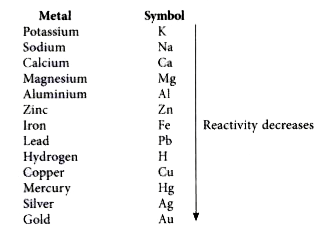
Which of the following represents the correct reactivity order of metals with water?
View SolutionMost of the metals react chemically with other substances in one form or another. Few metals which do not react with common chemicals are called noble metals e.g., silver, gold, platinum. The rate of reaction with which metals react is not same for all the metals. The rate of reaction depends on the reactivity of metals. On the basis of their reactive nature, a series known as reactivity series has been drawn in which metals are arranged in decreasing order of their reactivity.
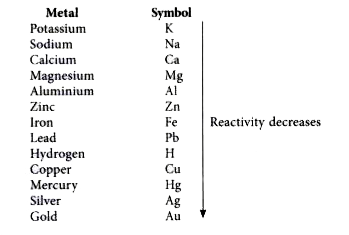
A strip of magnesium ribbon is added to some solutions of metal nitrates. Which metal nitrate will have no reaction with magnesium?
View SolutionMost of the metals react chemically with other substances in one form or another. Few metals which do not react with common chemicals are called noble metals e.g., silver, gold, platinum. The rate of reaction with which metals react is not same for all the metals. The rate of reaction depends on the reactivity of metals. On the basis of their reactive nature, a series known as reactivity series has been drawn in which metals are arranged in decreasing order of their reactivity.
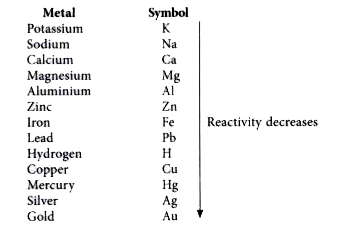
Pieces of copper, lead, aluminium and zinc are added to dilute hydrochloric acid. Which of the following test tubes most likely contains zinc?

View SolutionMost of the metals react chemically with other substances in one form or another. Few metals which do not react with common chemicals are called noble metals e.g., silver, gold, platinum. The rate of reaction with which metals react is not same for all the metals. The rate of reaction depends on the reactivity of metals. On the basis of their reactive nature, a series known as reactivity series has been drawn in which metals are arranged in decreasing order of their reactivity.
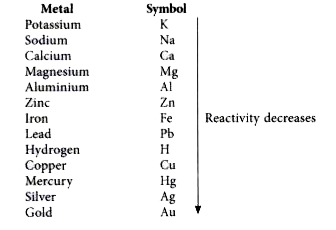
Which metal would not produce bubbles of hydrogen gas when added to dilute hydrochloric acid?
View SolutionMost of the metals react chemically with other substances in one form or another. Few metals which do not react with common chemicals are called noble metals e.g., silver, gold, platinum. The rate of reaction with which metals react is not same for all the metals. The rate of reaction depends on the reactivity of metals. On the basis of their reactive nature, a series known as reactivity series has been drawn in which metals are arranged in decreasing order of their reactivity.
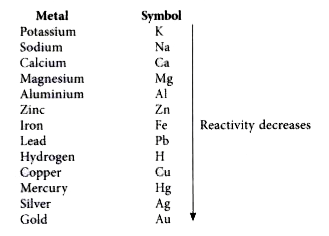
Observe the table given below:

= reaction takes place
= reaction does not take place
Identify the correct order of reactivity of the given metals.
View Solution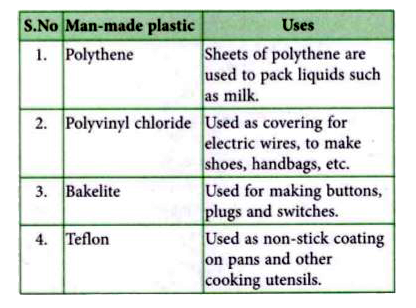
Which of the following is a copolymer?
View Solution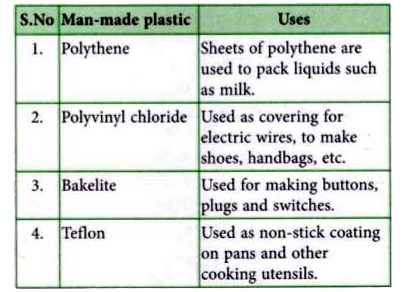
Which of the following is a synthetic polymer?
View Solution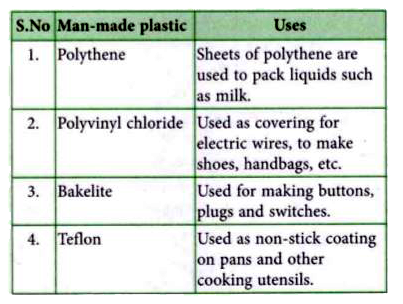
Which of the following is a branched chain polymer?
View Solution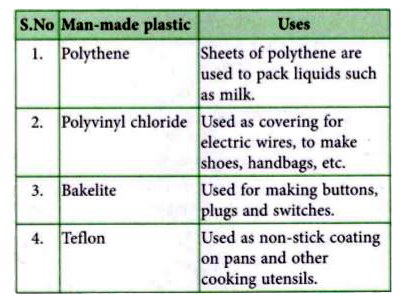
PVC is used for making raincoats and seat covers because
View Solution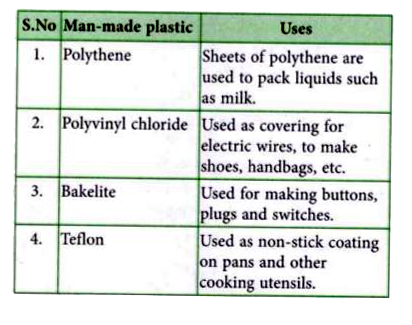
Which of the following is a thermosetting polymer?
View SolutionThe given figure represents destructive distillation of coal. Destructive distillation is the strong heating of a substance in the absence of air.
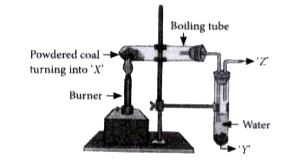
'X', 'Y' and 'Z' in the given figure is
View SolutionThe given figure represents destructive distillation of coal. Destructive distillation is the strong heating of a substance in the absence of air.
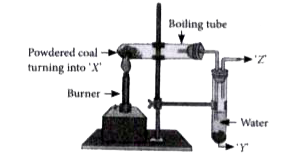
Match the columns.
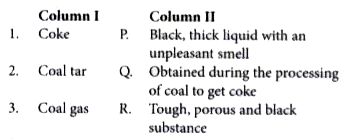
View SolutionThe given figure represents destructive distillation of coal. Destructive distillation is the strong heating of a substance in the absence of air.
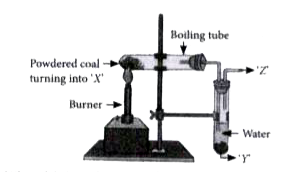
Which of the following is the correct statement?
View SolutionThe given figure represents destructive distillation of coal. Destructive distillation is the strong heating of a substance in the absence of air.
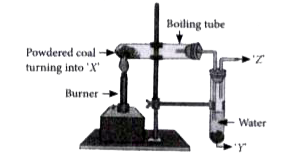
Coal is a fossil fuel and it cannot be prepared in a laboratory or industry because the formation of coal
(I) is a very slow process
(II) needs very low pressure and low temperature
(III) needs very high pressure and high temperature
(IV) causes air pollution
View SolutionThe given figure represents destructive distillation of coal. Destructive distillation is the strong heating of a substance in the absence of air.
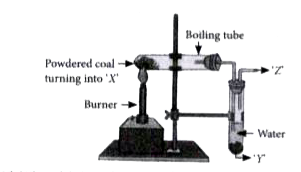
Pis processed in industries to get some useful products such as 'Q', 'R' and 'S. 'S' is obtained during the processing of P' to get 'Q, 'R' is a mixture of about 200 substances. Identify 'P', 'R' and 'S.
View SolutionA flame is the visible gaseous part of a fire. It is a zone of combustion of gaseous substances accompanied by evolution of heat and light. All substances do not burn with a flame. Only those substances that vaporise during burning produce flame. A candle flame is taken to study the various zones of a flame.
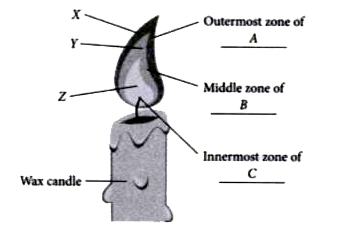
(A), (B) and (C) are respectively.
View SolutionA flame is the visible gaseous part of a fire. It is a zone of combustion of gaseous substances accompanied by evolution of heat and light. All substances do not burn with a flame. Only those substances that vaporise during burning produce flame. A candle flame is taken to study the various zones of a flame.
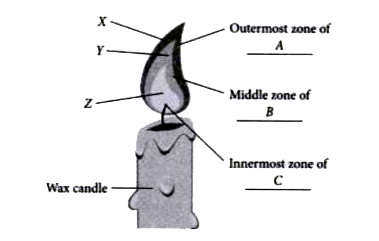
Arrange X, Y and Z in increasing order of temperature.
View SolutionA flame is the visible gaseous part of a fire. It is a zone of combustion of gaseous substances accompanied by evolution of heat and light. All substances do not burn with a flame. Only those substances that vaporise during burning produce flame. A candle flame is taken to study the various zones of a flame.
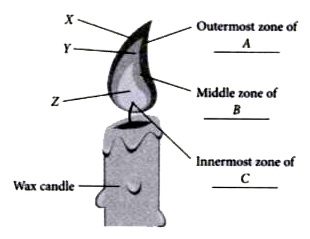
Which zone of a candle flame is the zone of no combustion?
View SolutionA flame is the visible gaseous part of a fire. It is a zone of combustion of gaseous substances accompanied by evolution of heat and light. All substances do not burn with a flame. Only those substances that vaporise during burning produce flame. A candle flame is taken to study the various zones of a flame.
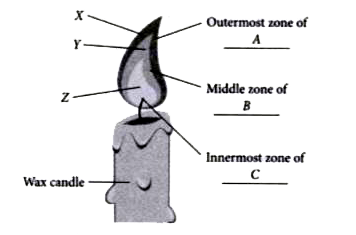
The luminous and non-luminous zones of flame is respectively.
View SolutionA flame is the visible gaseous part of a fire. It is a zone of combustion of gaseous substances accompanied by evolution of heat and light. All substances do not burn with a flame. Only those substances that vaporise during burning produce flame. A candle flame is taken to study the various zones of a flame.
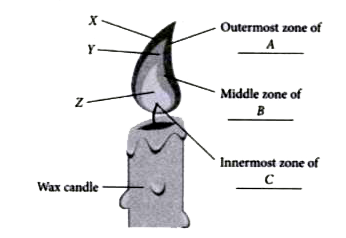
Different zones of a candle flame are marked by the letters (A), (B) and (C).
Which of the following statements are correct?
(I) (B) is the hottest part of the flame.
(II) (C) is moderately hot.
(III) (A) is the hottest part of the flame.
(IV) (A) is moderately hot whereas (C) is the coldest part.
(V) (C) is the luminous zone.
(VI) (B) is the luminous zone.
(VII) (A) is the dark zone.
View Solution
SECTION - A questions and complete solutions for chapter FOOTSTEPS towards(CBSE Board) of MTG IIT JEE FOUNDATION of Class 8